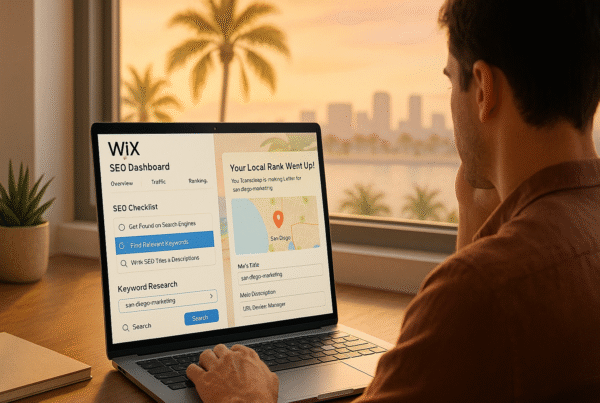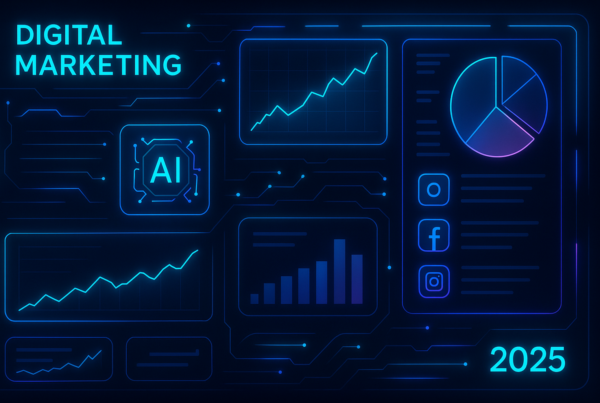Why Digital Marketing Is a Game Changer

Still relying on flyers and local billboards to grow your business? If so, you might be leaving opportunities on the table. Digital marketing has completely transformed how companies, especially small ones, reach their audience. 78% of small businesses in the U.S. now say they are using some form of digital marketing. Traditional marketing methods, such as flyers and TV ads, are losing their effectiveness. More customers are turning to online platforms for information, recommendations, and shopping.
In today’s online-first world, the benefits of digital marketing for small businesses are too significant to ignore. Small businesses can use smart digital strategies to compete with big companies. Best of all, they don’t have to spend a lot of money to do it. Digital marketing helps small businesses compete. It gives them tools to reach more people, boost engagement, and grow their brand.
As we dive deeper into this post, we’ll explore how digital marketing helps to grow your business and why it’s far more cost-effective and measurable than traditional marketing methods. If you wonder if digital marketing is for you, stay with us. By the end of this post, you’ll see why it’s key for small business success.
How Does Digital Marketing Differ from Traditional Marketing?
When it comes to growing your small business, choosing the right marketing method can be the difference between success and missed opportunities. Let’s break down how digital marketing stacks up against traditional marketing in key areas like cost, targeting, tracking, and scalability.
| Aspect | Digital Marketing | Traditional Marketing |
| Cost-Efficiency | Often more affordable with a range of budget options | Expensive, especially for TV, radio, and print ads |
| Targeting | Allows precise targeting by demographics, behavior, and interests | Broad targeting, generally based on location and audience size |
| Tracking & Analytics | Real-time tracking, measurable results (CTR, ROI, etc.) | Difficult to track directly, limited to anecdotal feedback |
| Scalability | Easily scalable; you can start small and grow over time | Limited scalability without major investment |
How does digital marketing differ from traditional marketing? In simple terms, digital marketing offers much more flexibility, precision, and insight into your efforts. Traditional marketing methods, such as TV ads or newspaper printouts, often require large up-front investments with uncertain returns. On the other hand, digital marketing allows small businesses to start with small budgets and scale as they see results.
1. Cost-Efficiency
Digital marketing is often a far more affordable option for small businesses. For example, a local coffee shop in Texas could run a Google Ads campaign targeting coffee lovers within a 5-mile radius with a daily budget of $10. This would allow the business to measure the effectiveness of the campaign and adjust it as needed, showcasing the benefits of digital marketing for small businesses.
Meanwhile, a competitor might run a billboard ad for $2,000 per month with no way to track who saw it or how many customers it brought in. This highlights how digital marketing allows for more cost-efficient, data-driven strategies compared to traditional, high-cost methods like print ads or TV commercials.
2. Targeting
The targeting capabilities of digital marketing are unmatched. Small businesses can tailor their campaigns based on factors like age, location, interests, and behaviors. For instance, a small business selling handmade candles could use Instagram ads to target women aged 25–45 who follow eco-friendly or aromatherapy pages.
In contrast, a traditional newspaper ad would be displayed to anyone who happens to pick up the paper, with no targeting options at all. Digital marketing ensures your ad dollars are spent efficiently by focusing on the audience most likely to convert.
3. Tracking & Analytics
Another key advantage of digital marketing is the ability to track and measure the effectiveness of your campaigns in real-time. A local fitness coach, for example, could use Facebook Ads Manager to track how many people clicked on an ad and then signed up for a class.
Traditional methods like flyers don’t offer the same actionable data. Instead of guessing how effective your campaign is, digital marketing gives you concrete numbers on click-through rates (CTR), conversion rates, and even the cost per lead, allowing you to refine your strategy for maximum return on investment. This is exactly how digital marketing helps to grow your business, providing valuable insights to optimize performance.
4. Scalability
As a small business, you may start with limited resources, and digital marketing allows you to scale your efforts as your business grows. You can begin with a simple social media campaign and, as you see results, expand into more complex strategies like email marketing, content marketing, and search engine optimization (SEO).
For example, a small online store could start by running a Google Shopping campaign with a $10 daily budget. As sales increase, they can scale their budget or try more advanced strategies, demonstrating the benefits of digital marketing for small businesses. On the other hand, scaling a print ad campaign would require significantly more investment upfront, making it harder for small businesses to grow at their own pace without substantial financial risk.
By offering greater flexibility in cost, targeting, tracking, and scalability, digital marketing provides small businesses with a powerful and measurable tool to grow their brand and increase their visibility, something traditional marketing cannot match.
Top 10 Benefits of Digital Marketing for Small Businesses
In today’s fast digital world, small businesses can compete with big companies more than ever. Digital marketing creates a fair chance for all brands. It helps smaller brands reach, engage, and convert their target audience effectively. Here are the top 10 benefits of digital marketing for small businesses. It shows how digital marketing can help your business grow and succeed online.
1. Cost-Effective Marketing
One of the most significant advantages of digital marketing is its affordability. Traditional ads, such as TV, radio, and print, can be expensive. This cost is often too high for many small businesses. Digital marketing provides many affordable options. These include social media, email marketing, SEO, and Google Ads. This way, you can run campaigns that match your budget.
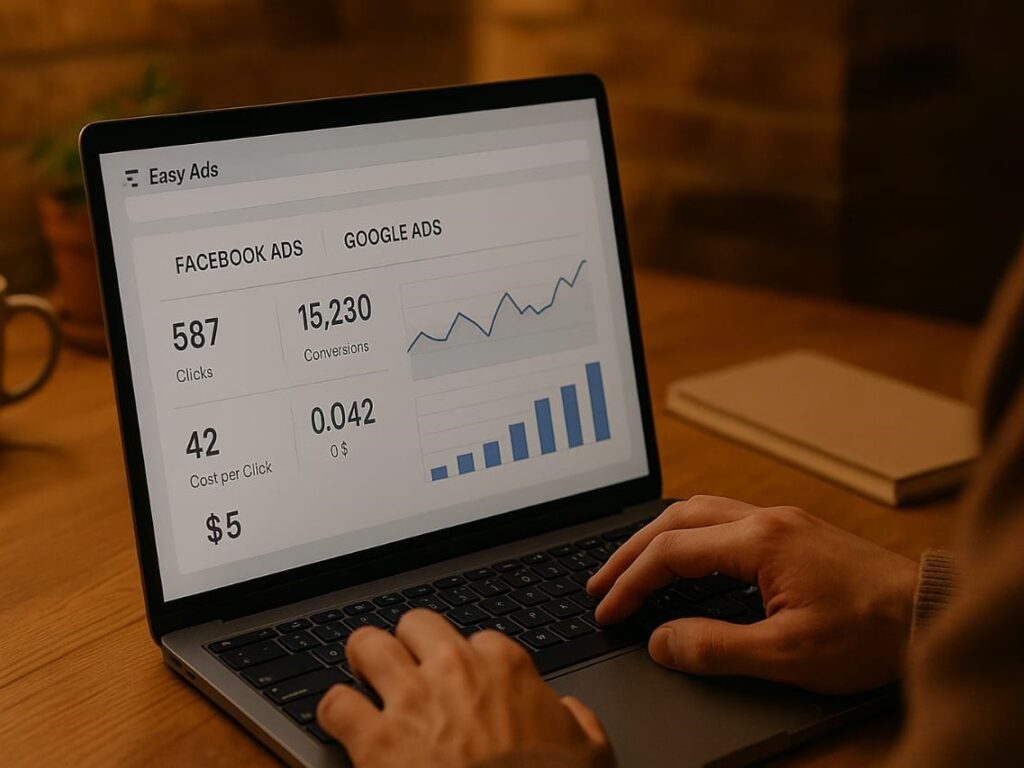
With digital marketing, you can start with a small budget and scale your efforts as you see results. A small boutique can run ads on Facebook or Instagram for just $5 a day. This helps them reach their target audience and boost foot traffic without spending too much. The key to how digital marketing helps to grow your business is its flexibility in terms of pricing and targeting, giving businesses the power to maximize their ROI and reach their marketing goals without overspending.
2. Better Customer Targeting
Digital marketing is different from traditional methods. It helps businesses target their ideal audience more precisely. They can focus on factors like age, gender, location, interests, and online behavior. This level of targeting is far more effective and efficient than placing an ad in a newspaper and hoping the right people see it.
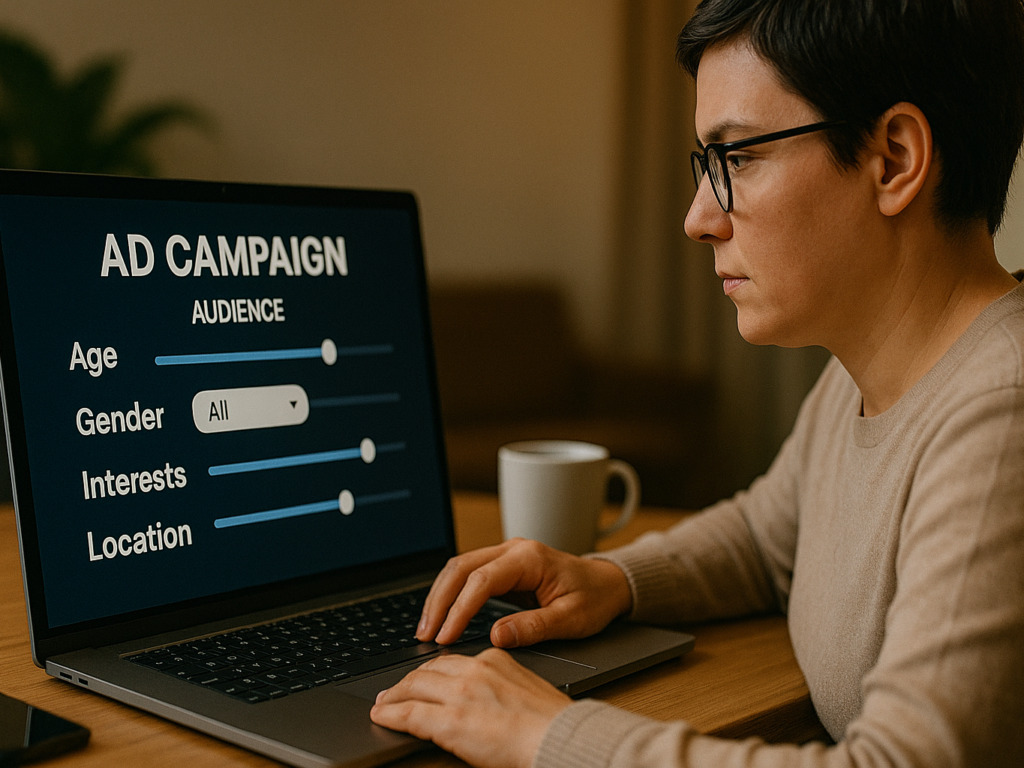
If you own a yoga studio, you can use Google Ads or Facebook Ads. These tools help you reach people interested in wellness, fitness, and mindfulness. You can also focus on a specific area where your studio is located. This ensures your ad money goes to people who are likely to buy. It helps your marketing work better. Digital marketing helps your business grow by finding the right audience. This skill drives higher-quality leads, showing the benefits of digital marketing for small businesses.
3. Measurable Results and Analytics
Digital marketing is different from traditional marketing. It offers real-time tracking and analytics. This means you can see how well your campaigns are doing right away. Tools like Google Analytics and Facebook Insights provide detailed metrics. These include click-through rates (CTR), conversion rates, return on investment (ROI), and customer engagement. Email marketing platforms also offer similar insights.
This ability to track results and gain actionable insights means you can make data-driven decisions, improve your campaigns, and optimize your strategy over time. Whether you’re measuring the success of a paid ad campaign or assessing the effectiveness of an organic SEO strategy, the measurable results digital marketing provides are invaluable for refining your approach and growing your business efficiently.
4. Local and Global Reach
Digital marketing has the power to expand your business’s reach both locally and globally. Whether you’re targeting customers in your immediate neighborhood or aiming for a broader international audience, digital channels make it possible to reach them with ease.
For example, a small bakery can use location-based ads on Google or social media to attract customers within a 5-mile radius. At the same time, if you sell handmade products online, you can use SEO and e-commerce platforms to reach a global audience. The ginternationalreach of digital marketing provides small businesses with the opportunity to scale their operations and tap into new markets that were previously inaccessible through traditional methods.
5. Builds brand Awareness
For small businesses, building brand awareness is critical to standing out in a crowded market. Digital marketing offers a wealth of tools and strategies that allow you to consistently engage with your target audience, helping to establish your brand identity and gain recognition.
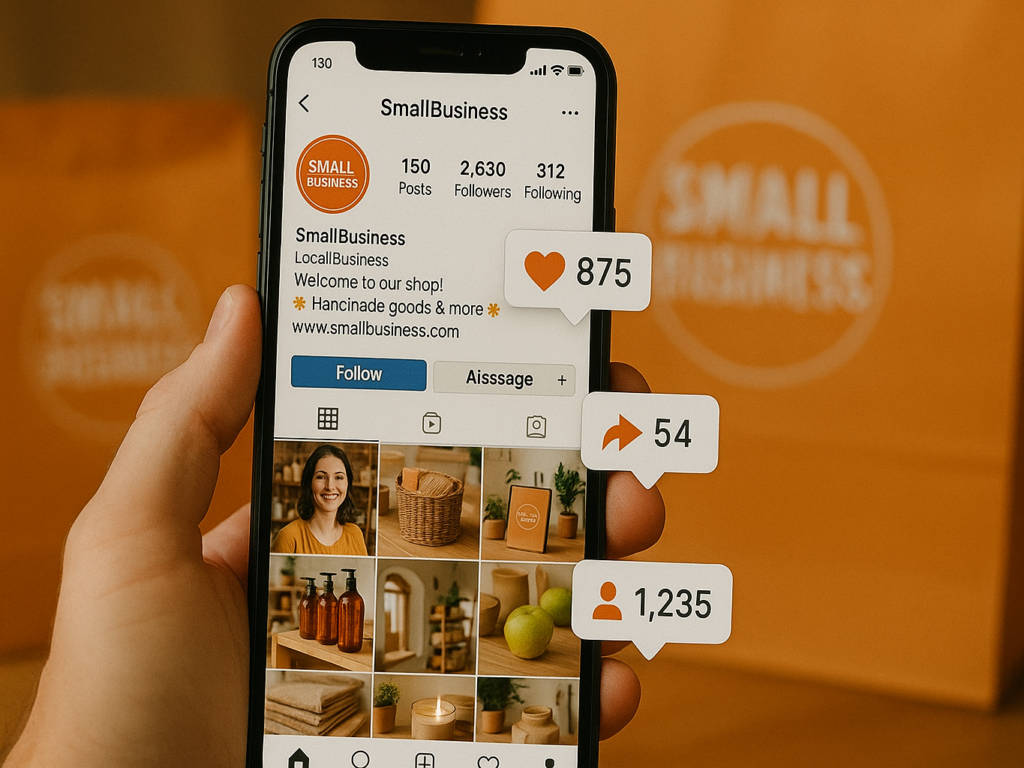
Through platforms like Instagram, YouTube, LinkedIn, and Facebook, small businesses can share content, post updates, and engage with their audience regularly. Over time, this consistency helps build brand trust and loyalty. Whether you’re creating blog posts, social media updates, or videos, digital marketing plays a pivotal role in making your brand visible, trustworthy, and memorable.
6. Improved Conversion Rates
One of the key benefits of digital marketing is its ability to improve conversion rates. With traditional marketing, it’s often difficult to know whether someone who saw your ad made a purchase or took action. However, digital marketing allows you to track user behavior closely, which helps improve conversion rates by optimizing your marketing efforts based on this data.
For instance, creating targeted landing pages with strong calls to action can help improve your website’s conversion rate. Additionally, email marketing allows you to send personalized offers and follow-up messages to your leads, nudging them towards completing a purchase. The ability to quickly test, tweak, and optimize campaigns is one of the reasons why digital marketing helps to grow your business by boosting conversions over time.
7. Flexibility Across Platforms
With digital marketing, you’re not limited to just one advertising channel. There’s a wide variety of platforms available to suit different business needs and customer preferences. From search engine marketing (SEM) and social media marketing to content creation and email campaigns, you can choose the platform that best fits your audience and business goals.
For example, if you’re a B2B service provider, LinkedIn might be the best platform for you, whereas a fashion retailer could focus on Instagram. Digital marketing offers the flexibility to tailor your strategy based on the strengths of each platform, ensuring your efforts are aligned with where your target audience spends their time.
8. Boosts Customer Engagement
Engagement is key to building strong, lasting relationships with your customers. Through social media, email marketing, and online communities, digital marketing enables direct interaction with your audience. Whether it’s responding to comments on your social media posts or engaging in a conversation via email, digital marketing allows you to connect with your customers on a personal level.
Customer engagement fosters loyalty and trust, making people more likely to choose your business over your competitors. By creating valuable content and building a community around your brand, digital marketing helps maintain ongoing relationships that lead to repeat business and referrals.
9. Easy to Personalize
Personalization is one of the most powerful aspects of digital marketing. Unlike traditional marketing, where you broadcast the same message to everyone, digital marketing enables you to tailor your messaging based on individual customer data and behaviors.
For example, email marketing tools allow you to send personalized offers to your customers based on their past purchases or browsing behavior. Similarly, retargeting ads can remind potential customers about your products or services after they’ve visited your website. This personal approach makes your marketing efforts feel more relevant and increases the chances of conversion. This is another way in which digital marketing helps to grow your business, by creating targeted campaigns that resonate with each customer.
10. Competitive Advantage Over Larger Brands
Small businesses often face challenges when competing against larger, more established brands. However, digital marketing provides an opportunity to level the playing field. While larger brands may have bigger budgets, small businesses can use digital tools like SEO, content marketing, and social media to compete effectively.
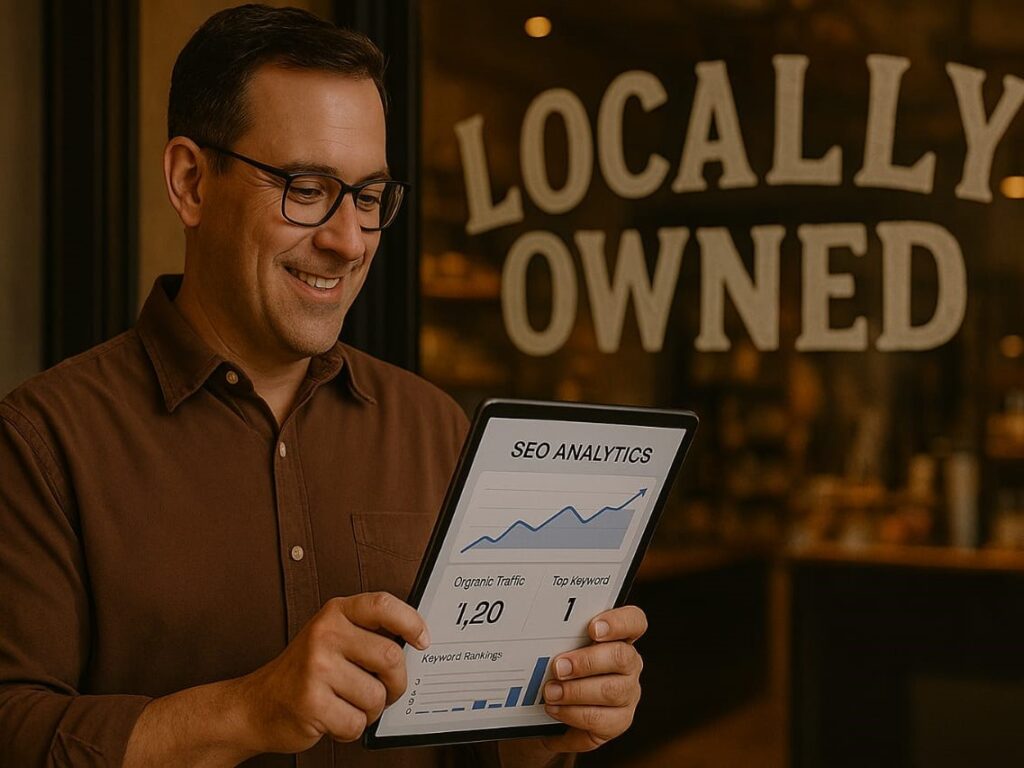
For instance, a small business can optimize its website for SEO, ensuring it appears in search results for specific keywords that its larger competitors may overlook. Additionally, small businesses can build a more personalized, direct connection with their audience through social media and customer service, which can give them a competitive edge over bigger brands that might rely on more impersonal, traditional marketing methods.
Take advantage of these top 10 benefits of digital marketing for small businesses. You can increase your visibility and build strong connections with customers. This will help drive growth and success.
Brewing Buddha’s Digital Marketing Success
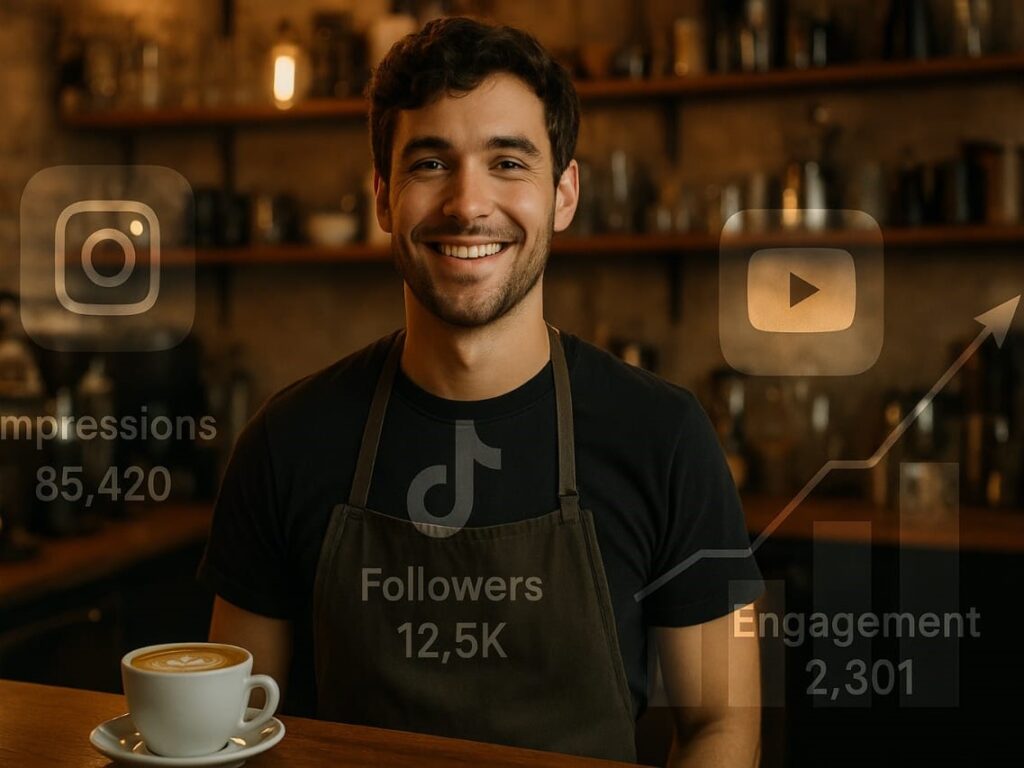
Brewing Buddha is a specialty coffee shop. Brothers Jordan and Cassidy Athos founded it. The shop is famous for its in-house roasted coffee. They offer unique flavors, such as campfire s’mores latte and banana bread latte. They have a loyal customer base, but they struggle to grow and reach new customers.
1. The Digital Marketing Strategy
Brewing Buddha teamed up with Button Up Media to boost its online presence. The strategy included:
- Content Creation: Make fun videos that show roasting techniques. Highlight different flavors, add funny skits, and include educational parts to highlight unique products and their special features.
- Social Media Engagement: Use various platforms to disseminate engaging content. This method boosts your audience size and increases user engagement. It helps build a lively online community and strengthens your bond with followers.
2. Results Achieved
Over five months, Brewing Buddha experienced significant growth.
- 450,000 impressions: Increased visibility across digital platforms.
- 26,000 engagements: enhanced interactions with their content.
- 2,600 New Followers: Expanded their social media community.
- 6.3% Engagement Rate: Surpassing industry averages, it indicates a strong audience connection.
This rise in digital engagement made it Brewing Buddha’s busiest time in eight years. They needed to hire an extra barista to handle the demand.
3. Owner’s Reflection
“The collaboration with Button Up Media transformed our approach to digital marketing. The tailored content and strategic engagement not only attracted new customers but also deepened our connection with existing ones.” Jordan Athos, Co-founder of Brewing Buddha
This case shows how digital marketing can grow your business. It does this by increasing your online visibility and engagement. Digital marketing offers clear benefits for small businesses, as shown by Brewing BBuddha’ssuccess. With the right strategy, small businesses can achieve significant growth.
Digital Marketing Channels Small Businesses Should Use

In digital marketing, a universal approach doesn’t exist. For small businesses that want to grow and keep customers, choosing the right digital marketing channels is key. Here, we outline essential digital marketing tools that every small business should explore:
1. SEO (Search Engine Optimization)
SEO boosts your website’s ranking in search engine results pages (SERPS). This helps potential customers find you more easily. It includes on-page tactics like keyword optimization and meta tags. It also covers off-page strategies such as backlinks and local listings.
SEO offers a cost-effective method for small businesses to attract organic traffic. Top-notch, search-friendly content helps reach local or global audiences without click costs.
SEO delivers long-term benefits. When your website ranks for the right keywords, traffic comes in for free. This is different from paid ads. Good SEO brings in visitors long after you spend money on it. This can give you a great return on investment over time, showcasing the benefits of digital marketing for small businesses.
2. Social Media
Social media marketing takes advantage of Facebook, Instagram, Twitter, LinkedIn, and TikTok. It connects with your audience, highlights your products or services, and builds a brand community.
Social media has billions of active users worldwide. This offers small businesses a key chance to connect with customers and boost their brand visibility. Companies can bincreasevisibility and engage with their audience through organic posts or paid ads.
Social media can offer high ROI, especially for businesses that create engaging and shareable content. Platforms like Instagram and Facebook let you run targeted ads. You can start with a budget as low as $5 a day. This is great for tight budgets.
3. Email Marketing
Email marketing means sending emails to customers or potential buyers. It aims to promote products, share content, or build customer loyalty. It is a direct, personal communication method with your audience.
Email marketing keeps small businesses connected with customers regularly. It also boosts customer retention and sales through newsletters, promotions, and tailored offers.
Email marketing boasts one of the highest ROI figures in digital marketing. HubSpot shows an average return of $42 for every $1 spent. This makes it essential for building customer relationships and encouraging repeat sales.
4. Google Ads
Google Ads is a pay-per-click (PPC) platform. It allows businesses to run targeted ads on Google’s search engine and Display Network. It will enable bidding for ad placements when users search for relevant terms.
Google Ads helps small businesses target specific keywords. This means they can show up at the top of search results when people look for similar products or services. This facilitates capturing potential customers who are ready to purchase.
Google Ads can bring quick results. With the right management, they can also provide a strong ROI. Investing is important, but precise targeting and tracking make it easier to measure results. This helps optimize campaigns for better profits.
5. Content Marketing
Content marketing means creating useful content like blogs, videos, infographics, and case studies. This content engages your audience and teaches them about what you offer.
Content marketing builds trust with your audience. It also boosts SEO rankings and positions your business as an industry leader. Small businesses can attract more visitors and increase sales. They can also build brand loyalty by sharing helpful content.
Content marketing provides substantial long-term ROI. Creating high-quality content takes effort at first, but it can draw visitors for months or even years. Moreover, content can be repurposed across various channels, amplifying its value.
Which digital marketing channels offer the highest ROI for small businesses?
1. SEO
Although it may take time to see results, SEO boasts one of the highest ROI rates. As your website climbs in search rankings, traffic keeps coming. This draws in customers without extra costs.
2. Email Marketing
It’s low-cost and offers a great return. For every $1 spent, you can earn $42. This makes email marketing very effective for small businesses. It maintains direct communication with your audience, enhancing customer retention and increasing sales.
3. Social Media
It has a broad reach and low ad costs. This helps small businesses connect with audiences around the world. Organic content builds strong relationships. Paid ads can provide high returns with targeted campaigns.
4. Google Ads
It offers quick visibility and results. But ROI can change depending on how well the ads are optimized. Targeted ads can significantly help businesses. Regularly improving campaigns brings even more benefits.
5. Content Marketing
It requires time and effort. Still, content marketing is essential for long-term growth. Quality content improves SEO and makes your brand a thought leader. This builds trust and boosts engagement.
By using these digital marketing channels, small businesses can connect with their audience, create a solid online presence, and see great returns on their investment. To boost business success, use the right mix of strategies. Focus on SEO for steady growth, social media for quick engagement, and email marketing to build relationships.
Common Mistakes Small Businesses Make with Digital Marketing

Digital marketing is vital for small businesses. But even great efforts can miss the mark because of common mistakes. Here’s a quick overview of the most frequent missteps and how to avoid them.
1. Poor targeting
Small businesses often try to reach too many people at once. This leads to wasted resources and low engagement. Define your ideal customer. Use tools like Google Analytics and social media insights to help. This will help you reach the right people and boost ROI.
2. No Content Plan
Posting without a clear strategy leads to uneven engagement. Make a content calendar that matches your goals. Focus on creating valuable content that connects with your audience. This builds trust and engagement over time.
3. Ignoring Analytics
Without tracking performance, it’s impossible to know what is working. Check your metrics often with tools like Google Analytics and Facebook Insights. This helps improve campaigns and boost conversions. Data-driven decisions lead to better results.
4. Focusing only on one channel
Relying solely on one marketing channel limits growth. Broaden your strategy with SEO, social media, email marketing, and paid ads. This helps you connect with more people and achieve lasting success.
5. No Clear Call-to-Action (CTA)
Without a clear CTA, you risk losing potential customers. Always include a strong CTA, whether it’s to buy a product, sign up for a newsletter, or follow your social media. Test and optimize your CTA to maximize conversions.
Getting Started with Digital Marketing (Without Feeling Overwhelmed)
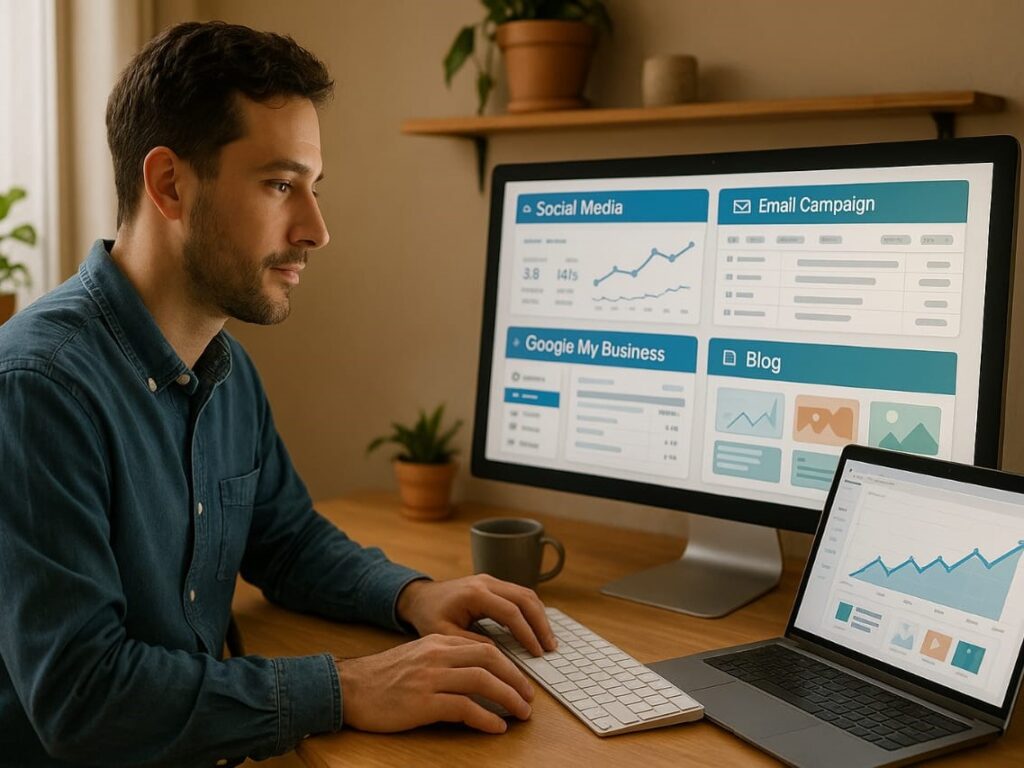
Digital marketing can be tough to navigate, particularly for small business owners who are new to it. But the truth is, getting started doesn’t have to be complicated or overwhelming. Take small, smart steps. This way, you can enjoy digital marketing benefits without feeling overwhelmed.
Here are easy steps to start your digital marketing journey. We’ll also share some budget-friendly tools to help you along the way.
1. Define Your Goals and Target Audience
First, define your goals. Then, understand your target audience before using tools and tactics. What are you trying to achieve with your digital marketing efforts? Are you aiming to increase sales, build brand awareness, or grow your email list?
Once you have established your goals, create a clear picture of your target audience. Understand their demographics, interests, and where they spend most of their time online. This will help you shape your digital marketing strategy. You’ll reach the right people with the right message.
Write down 2-3 primary goals for your business and identify 3threekey characteristics of your ideal customers.
2. Start with Social Media
Social media is an easy and cheap way to market your small business. Platforms like Facebook, Instagram, and LinkedIn have free tools. You can use these to connect with your audience and promote your business. Plus, it’s a great way to build brand awareness and drive traffic to your website.
Set up business profiles on 1-2 social media platforms. Facebook and Instagram are great choices. Post regularly, interact with followers, and share content that resonates with your audience.
Create stunning posts, stories, and banners for your social media using Canva. Canva has free templates and is user-friendly, even if you don’t have design experience.
3. Set Up Your Google My Business Profile
If you have a local business, setting up a Google My Business profile is a must. It helps you appear in Google searches and maps. This way, customers can find businesses like yours nearby. This free tool enables you to manage your business info. You can respond to reviews and post updates. These updates show up in Google search results.
Claim your Google My Business profile. Make sure to fill in all your details. This includes your address, phone number, business hours, and website.
Google My Business is entirely free and straightforward to establish. This vital tool helps customers find your business online. It boosts visibility and engages potential clients.
4. Build an Email List and Start Email Marketing
Email marketing helps you connect with customers and build lasting relationships. Send newsletters, promotions, and updates. This keeps your audience engaged and boosts repeat business.
Start gathering email addresses from your website visitors, social media fans, and customers who visit your store. Offer a simple incentive, like a discount or a free guide, to encourage sign-ups.
Mailchimp is an excellent tool for email marketing. It has a free plan for new businesses. You can easily create and send professional emails to your list. Plus, it has automation features to send emails at the right time.
5. Create and Share Content That Adds Value
Content marketing lets you educate your audience. It builds trust and increases website traffic. It can include blog posts, infographics, how-to videos, customer success stories, or industry news. The key is to provide valuable content that your audience finds useful.
Write a blog post or create a video answering a common question your customers have. Please share it on your website and social media channels.
Use Canva to create visuals. For hosting your blog, try WordPress or Wix. These platforms have user-friendly features and great templates to get you started.
6. Monitor and Adjust Your Efforts
Digital marketing is not a “set it and forget it” activity. To fully realize the benefits of digital marketing for small businesses, you need to track the performance of your campaigns to see what’s working and what’s not.
Tools like Google Analytics measure your website traffic, while social media insights show how well your posts perform. Check your website and social media analytics weekly. Look for trends and patterns, see which posts get the most engagement, and identify the most visited pages on your website.
By adjusting your strategy based on this data, you’ll unlock the benefits of digital marketing for small businesses more effectively. Google Analytics is a free tool that’s simple to set up and offers key insights on how users find and interact with your website, ultimately improving their experience.
Conclusion: Go Digital, Grow Smart
In today’s digital world, small businesses have more opportunities than ever before. A good digital marketing strategy lets small companies compete with the big players. Using tools like social media, email marketing, SEO, and Google Ads can help you grow your brand. These methods drive traffic and turn leads into loyal customers. Plus, they cost much less than traditional marketing.
The benefits of digital marketing for small businesses are undeniable. Digital marketing offers many benefits. It lets you reach a global audience. You can easily track performance, too. Plus, you can adjust campaigns in real time. This levels the playing field for everyone.
Remember, size doesn’t matter; strategy does. Even if your business is small, a clear digital marketing strategy can lead to big growth and success. Act now to build a strong online presence. This keeps you competitive and sets your business up for long-term success.
If you’re ready to take the next step, why not explore more? Check out our complete guide on digital marketing strategies for small businesses. You can also reach out to us today for a free audit of your digital marketing efforts. We’re here to help you grow smarter, not harder.
FAQs on the Benefits of digital marketing for small businesses
Digital marketing helps your local shop grow. It attracts nearby customers using local SEO, Google Business listings, and social media. Digital marketing hallowssmall businesses in many ways. It boosts foot traffic, generates reviews, and promotes deals online. These actions keep your shop competitive in your neighborhood and beyond.
Digital marketing offers small businesses several key benefits. First, it provides cost-effective advertising. Second, it allows for better customer targeting. Third, it boosts brand visibility. Lastly, it enables real-time performance tracking. It helps businesses reach more people online. They can build trust with content and grow quickly, even on a tight budget. It’s measurable, scalable, and incredibly flexible.
Yes, digital marketing is often cheaper than traditional methods. It offers better ROI with options like pay-per-click, email marketing, and content marketing. A significant benefit of digital marketing for small businesses is its low cost. This lets even those on a tight budget compete well and reach their ideal audience.
Absolutely. With the right strategies, small businesses can thrive online. Digital marketing helps small businesses by leveling the playing field. It allows them to target niche markets, use analytics for optimization, and create loyal online communities. Creativity, consistency, and smart targeting let small brands challenge even big-name competitors.



